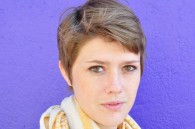By Susi McGhee
VE Volunteer from Georgia, USA
I have been in Santiago for about a week now and am quickly beginning to feel more comfortable in this massive city. My first weekend was spent with Elodie, a French girl who is also working through VE Global. Over the weekend, we wandered around the city, desperately trying to keep up with Chilean Spanish. My Spanish is hardly impressive as is it, but Chilean Spanish manages to demote my already low standing. In addition to speaking some of the fastest Spanish in the world, Chileans use a lot of slang and also tend to leave off certain sounds of their words, while adding others on at the end. My Spanish needs much improvement and it is extremely frustrating to not understand what is going on around you, but I feel much more in tune with my surroundings–always listening, watching, absorbing as much as I can.
All of the VE directors and current volunteers have been extremely welcoming and have offered us so much advice and support, as well as delicious, home cooked meals throughout the week. Our orientation training began on Monday, during which we have been learning about the institutions we will work in, learning styles and effective education, Chilean history, food and slang, health and safety, the ins and outs of fundraising and marketing, among other charlas. On Thursday, we visited Parque por la Paz, which is a commemorative site of resistance victims during Pinochet’s dictatorship. During the 70s, over four thousand men and women were imprisoned and tortured at Villa Grimaldi– it was a very moving experience to be there, in the place where so much injustice occurred. The site has been filled with various art installations, monuments and gardens to honor those who were lost. I find it so hard to believe how recently these events took place. Unreal.
Thursday, I visited Mi Club Domingo Savio, which is where I will be working for the next four months. Steve Reifenberg, a former volunteer during the eighties, actually wrote a book about his experience at Domingo Savio, which at the time was an orphanage. Domingo Savio is now a community center in La Granja, a very poor area in south Santiago. There are between forty and fifty children aged 5 to 16, all from low-income backgrounds, who come to the center after school and stay until about 7:30pm. Domingo Savio works to keep these kids away from and out of risky and dangerous environments in their homes and throughout the community. Problems with substance abuse and family violence are extremely prevalent in these areas. When I visited on Thursday, I quickly began working with the oldest kids, who were in the middle of a math lesson. It was extremely intimidating and overwhelming to be tossed right into it all, but I was able to engage and work with one of the oldest girls on her remaining problems. This felt like an accomplishment– not only because I haven’t done long division since high school, but because I was able to offer her feedback and help her understand where she may have gone wrong in her solving process. Again, my Spanish is limited, but my listening is developing quickly and I hope that speaking with confidence will soon follow.


